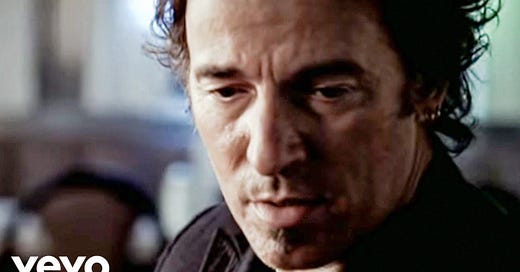We all have our little rituals, especially the ones that get us through trying times, and for me, one of those rituals is grabbing my guitar and playing some Springsteen on Election Day morning.
Readers of this Substack are probably pretty aware of how much I love the Boss. It’s a love that fills me with slight pause today, because demographically, Bruce Springsteen kind of represents what we’re trying to get away from in America — the dominance of the aging white boomer. But, spiritually, Bruce is and forever will be my guy. For me, his music portrays the lifelong collision between our grandest hopes and our starkest realities more vividly than any other artist. And, you know, at this point I’m pretty much an aging white man too (don’t call me a boomer, though! I’m an elder millennial, thank you), so for me, it’s certainly an appropriate choice.
The song I typically break out on Election Day is “Long Walk Home,” an all-time top-10 Bruce tune for me, off Springsteen’s vastly underrated 2007 album Magic. Magic hit at an interesting time for Bruce, when his recent Americana work with the Seeger Sessions band met America’s righteous anger at the second term of an inept, criminal Bush presidency. What resulted is probably the heaviest, tightest record Bruce ever recorded, but also one that was actively aware of its position in sociopolitical discourse in a way that Springsteen’s rock albums hadn’t really been pre-Seeger1 (The Rising often gets touted as Bruce’s first political album with the E Street Band, but he wasn’t trying to make a political statement with that one; it’s just that any immediately post-9/11 art was assigned political significance by a nation grasping for meaning).
If you can believe it (I’m sure you can), I once wrote a paper on this very topic that I presented at an academic symposium about the music of Bruce Springsteen at New Jersey’s Monmouth University in 2012. The paper was called "‘We Take Care of Our Own’: Shifting Pronouns and Springsteen's Move to Folk Troubadour,” and I think it holds up (maybe I’ll share it on here one day, lol)! The overall thesis of the paper is that, as Springsteen’s career progresses, his pronoun use changes — in his earliest records, where he’s heavily in a Dylan mold, it’s all third person singular, referencing colorful characters that his songs burst with, like “Hazy Davy” and “Big Bones Billy.” With his 21st century embrace of political engagement, though, comes an emphasis instead on the first person plural. This is most obvious on his 2012 anthem “We Take Care of Our Own,” but you can see its seeds in songs on Magic for sure, including “Long Walk Home.” In addressing the civic realities of our world, Bruce’s music simultaneously begins to speak for all of us.
Here’s my favorite bit of lyrics from “Long Walk Home,” and some of my top Bruce lyrics of all time:
My father said "Son, you’re lucky in this town
It’s a beautiful place to be born.
It just wraps its arms around you -
Nobody crowds you, nobody goes it alone.
That flag flyin’ over the courthouse
Means certain things are set in stone
Who we are, what we’ll do
And what we won’t.”
Starting in July of this year, Bruce added “Long Walk Home” back into his regular setlist, introducing it as “a prayer for our country.”
Who are we? What will we do? What won’t we? These are questions we can’t avoid on Election Day.
Please vote today — and vote with empathy, care, and thoughtfulness. It’s a hard world, and we don’t need to make it any harder for the people who already have the deck stacked against them. I live in a swing state, so I’m not messing around — it’s straight Democrat all the way down the ticket for me.
But also — voting isn’t the end of sociopolitical engagement, it’s the start of it, and I truly believe that a more just and kind society depends so much on the personal interactions we have every day and the care we infuse into the communities around us. “Who we are, what we’ll do, and what we won’t” is an ongoing project. May we all explore those questions in a way that aligns us with the people we most want to be.
Here’s my 2024 contribution to my Election Day ritual.
The important exception is 1995’s The Ghost of Tom Joad, which centers the plight of immigrants in the U.S. However, this was more or less a solo acoustic record, hence my caveat about politicizing his music with the E Street Band. And even with Tom Joad, he’s not really calling out the Clinton administration directly.




